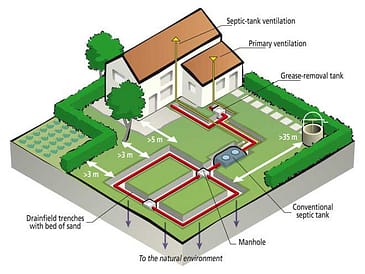1. Introduction
Septic systems play a crucial role in managing household wastewater, but they are not always feasible for every property. Whether due to soil conditions, space limitations, or environmental concerns, homeowners often seek alternative solutions. In this article, we delve into various alternatives to traditional septic tanks, examining their advantages and disadvantages.
2. Common Alternatives
2.1. Mound Systems
Mound systems are designed for properties with shallow soil over bedrock or high water tables. Here’s what you need to know:
Advantages:
- Effective wastewater treatment.
- Reduced risk of water pollution.
- Suitable for challenging soil conditions.
Disadvantages:
- Higher installation cost.
- Requires additional space for the mound.
2.2. Aerobic Septic Systems (ATS)
ATS relies on aerobic bacteria to enhance treatment efficiency. Consider the following:
Advantages:
- Can handle higher organic loads.
- Smaller drain field footprint.
- Effective treatment due to aeration.
Disadvantages:
- Requires electricity for aeration.
- Regular maintenance needed.
2.3. Cesspool Systems
Cesspools are a simpler alternative, but they come with limitations:
Advantages:
- Lower installation cost.
- Suitable for specific soil conditions.
Disadvantages:
- Limited capacity.
- Risk of groundwater contamination.
2.4. Sand Filter Systems
Sand filters provide effective wastewater filtration. Here’s what to consider:
Advantages:
- Compact design.
- Suitable for smaller properties.
- Effective filtration.
Disadvantages:
- Regular maintenance required.
- Potential clogging issues.
2.5. Constructed Wetlands
Constructed wetlands mimic natural processes for wastewater treatment:
Advantages:
- Aesthetic appeal.
- Supports wildlife habitat.
- Natural treatment process.
Disadvantages:
- Requires sufficient space.
- Longer treatment time.
2.6. Drip Irrigation Systems
Drip irrigation systems distribute treated wastewater efficiently:
Advantages:
- Minimal land disruption.
- Suitable for various soil types.
- Efficient water distribution.
Disadvantages:
- Initial cost can be high.
- Maintenance needed to prevent clogging.
3. DIY Option: Building Your Own Septic Tank
For those with the inclination and proper permits, constructing a septic system can be a viable DIY project. We outline the steps involved in building a septic tank.
4. Conclusion
Exploring alternatives to septic tanks is essential for sustainable wastewater management. Assess your property conditions, consult local regulations, and choose the most suitable system. Remember that professional advice is crucial when making these decisions.
Sources:
- Upgradedhome.com: Top Alternatives To Septic Tanks
- Freedomresidence.com: Alternatives to Septic Systems for Cabins
- Theseptictanker.com: Septic System Alternatives
Remember, informed choices lead to better environmental stewardship. 🌿🏡



